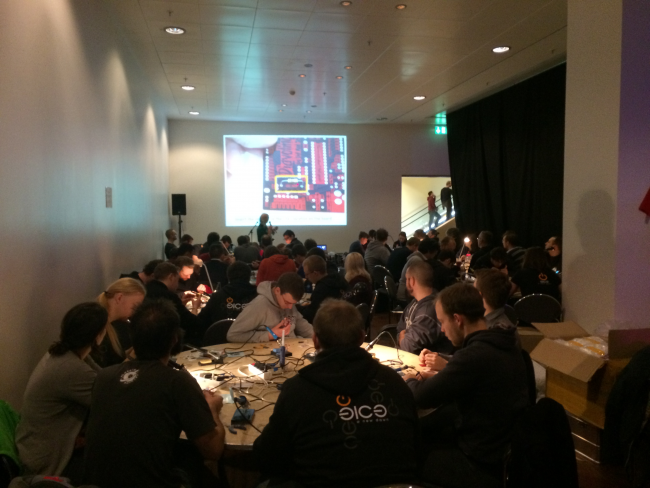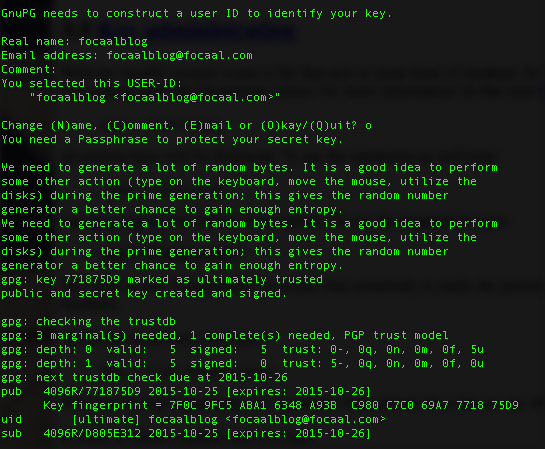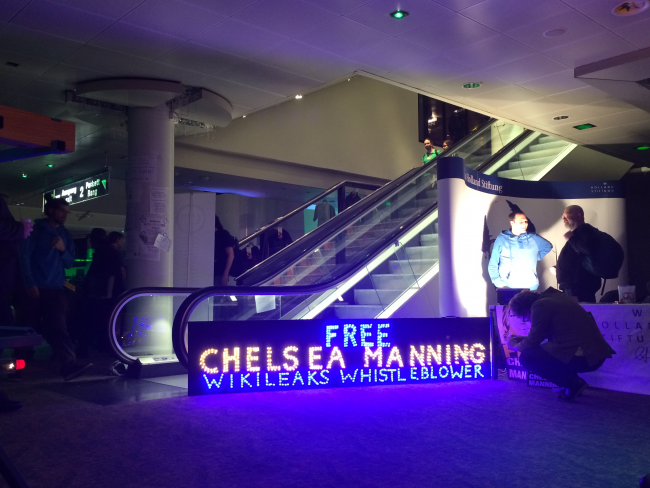David Bozzini is a research fellow at the Graduate Center, CUNY, where he is researching on Eritrean deserters movements and on the resistance to digital surveillance. He co-edits Tsantsa, the journal of the Swiss Ethnological Society.
Gabriella Coleman is an anthropologist and holds the Wolfe Chair in Scientific and Technological Literacy at McGill University in Montreal, Canada. She wrote about the free software movement in her book Coding Freedom: The Ethics and Aesthetic of Hacking. After years of researching Anonymous and following its online discussions and debates, she published Hacker, Hoaxer, Whistleblower, Spy: The Many Faces of Anonymous (Verso, 2014).
Introduction: Hackers, open source, and secrets
Computer hackers have recently had a significant political impact in various continents, and their actions frequently make headlines. Hackers played a crucial role during the Arab Spring and the Occupy movement, offering solutions and services to demonstrators. In this, they have drawn public attention to injustices not only by highlighting these inequities but also by finding and making public proof, such as leaked documents, and by supporting whistleblowers such as Edward Snowden and Chelsea Manning. While computer experts active as hackers have entered the realm of contentious politics in recent years, many of their political commitments are older and more focused on immediate spheres of work and life: they demand free and open-source software development, alternative decentralized architectures, and improved security and privacy for everyone in the Information Age. So, hackers importantly engage with how our digital lives are shaped and seek to improve our understanding of what is at stake in a networked society, as the powers and potentialities set free by the IT revolution are enormous but their technicalities are difficult to grasp and assess. In a world where the digital becomes increasingly entangled with our daily routines and security, hackers and whistleblowers help citizens and social scientists to understand how our societies are changing and must be defended.
This interview is divided in two parts. The first part delves into the hackers’ worlds and the historical process related to their political formations. The second part is devoted to recent political actions of hacker groups and the Anonymous collective in particular. Gabriella Coleman presents and discusses their tactics and tools, their modus operandi, and the limits of the movement.
It is important to start with having an idea about what hackers and the range of their activities are. You have argued that hackers are not a homogeneous group, yet is there something like a hacker or a hacking (sub)culture?
When I started studying free and open-source development (F/OSS),1 the term “hacker” was very contested among hackers themselves. You know, hacking might generally be seen as a kind of form of technical innovation and inventiveness in the realm of computers, but that can mean very different things: it can designate people who write software, people who circumvent systems in order to gain access; it can mean building hardware. What they all share is a kind of passion and commitment to cleverness or craftiness. But aside from that, it’s very different writing software versus doing security research versus intruding into a system. There are many subgenres of hacking, and while many of these practices share some aesthetic similarities, there are notable ethical differences. I got interested in those differences and trying to understand what is shared by hackers and what we have to attribute to different lineages. I’ve looked at the three different lineages: free software, which originated in university communities; a transgressive tradition whose practitioners might break into systems for exploration and the pleasures of transgression (its roots lie in phone phreaking, the practice of entering the phone system); and then a tradition in cryptography, which seeks to improve security.

Free soldering tutorial, organized and taught by Mitch Altman, Chaos Communication Congress, Hamburg, December 2014 (Photo: David Bozzini)
There are many different ways to become a professional software developer. But in terms of career history, how do hackers experience the boundaries between F/OSS on one side and the private lucrative industry on the other? Do most of them begin working on F/OSS and later become employed by software companies? Do they work simultaneously on F/OSS and proprietary projects?
Well, it depends which historical era are you looking at and which region of the world. And we’ll get there in a second. Independent of the period of time or the region, there are certain dynamics that are common across the decades, and one of the most interesting is that hackers are one of the few professionals who can have a career without having a higher degree in computer science. Of course, this can be the case in any field, but there are large numbers of hackers who end up working in a workforce whether it is for a nonprofit, academic, or corporate entity, and they are self-taught or they never got a college degree at all. I think that’s very unusual.
That said, for much of the ’90s and the early part of the twenty-first century, people who were contributing to free software were not doing it to land in a corporate job. Especially in the ’90s, it was something that was so marginal that no one really thought that by contributing to free software you would be employable. People would often keep that information secret, or at least they would not advertise it. What I find fascinating is that eventually there were enough people, using and developing in free software and implementing it in corporations behind the backs of their managers (see Coleman 2012), that they could start to be public about it. But their motivation initially was because they were committed to free software, either pragmatically or ideologically—pragmatically because it was a better way to develop software, ideologically because it was a technical method to instantiate freedom. Now, later on, as open source became the basis for companies (see Kelty 2008), there emerged definitely a corps of developers who embraced open software development because they could be employed that way in companies. The motivations changed when the status of open source changed in the economy, and here it is where the regional focus is very important. In Silicon Valley, the preexisting start-up culture melded with open source. And although today there is less enthusiasm for open source in Silicon Valley, there was a period of time where that was very important. In Europe, the scene is very different. There are less technologists/hackers who want to be entrepreneurs. In Europe, start-up culture is less influential.
Hackers’ politics is a major theme in your research projects. F/OSS has obvious political and moral aspects, but can you briefly sketch the larger political history that has been unfolding over the past decades? What are crucial moments that have shaped the political commitment of software developers, computer scientists, and hackers?
First of all, it’s important to disturb two ideas: that hackers only engage in politics through technology and that they are all libertarian. Now, both of those are true to some degree: you write free software, you write Tor2—a lot of what hackers do politically happens through technology and software. But things like whistle-blowing, Anonymous, and Pirate Parties International clearly indicate that hackers are engaging in many different modalities of politics. They tend, in the West, to have an orientation that spans from the liberal to the libertarian to the anticapitalists. What is unique about hackers is that different projects allow hackers with different political sensibilities to work together. So you could be anticapitalist and I could be libertarian, but we can still work together. That’s really common among hackers. When you start drilling into the different genres of hacking, the story of how they became more politicized (beyond writing free software) depends basically on confrontation with state or corporate power. There have been very punctuated moments where the state has gone after hackers, either with the state’s own judicial and executive powers or with the support of corporations, and this politicized the hacker community. There are dozens of examples. One of the most important of these moments was a big raid against the hacker underground community in the ’90s, Operation Sundevil, where the FBI was trying to shut down a bunch of underground hacker groups. One hacker got in trouble because he had published an AT&T manual which was for the 911 telephone system. But this person received a lot of support, and the ensuing legal battle over this document was the basis for the chartering of the Electronic Frontier Foundation (EFF).3 In the case of free software, when the Digital Millennium Copyright Act was applied to DeCSS—a short program that allowed DVDs to be decrypted—this also deeply politicized the community. What is interesting to ask is why the hacker can be politicized. Just because a state or corporations go after hackers doesn’t mean they are going to rise up, right? There are a couple of attributes, and I am not going to mention all, but one that is really important is that hackers have built and inhabited what sociologists of social movements call “free spaces.” A free space can be something like a church, a coop, a bookstore—they are spaces that are free from the colonization of dominant ideologies; they are in control of the people who make them collectively. Hackers have a lot of free spaces: the bulletin board systems (BBS),4 Internet Relay Chat (IRC),5 hackerspaces,6 mailing lists, free software projects. These free spaces are not inherently political, but they are a resource that can help the process of politicization under certain circumstances.
Confronting big powers as Anonymous and other groups did is risky. Where do their motivations to take such actions come from?
First of all, when someone does something, it inspires others to do something similar. I think that’s what we saw with Manning,7 WikiLeaks, Snowden,8 Anonymous; the torch was carried on. Jeremy Hammond9 was inspired literally by the leak provided by Chelsea Manning. Hammond was already in trouble with the law. He was on probation (for a previous hack), having done two years in jail, but he couldn’t help himself probably because he was so excited that others were rising up. But there is also a kind of insatiable curiosity to know, to learn, to understand how the system works that exists independent of the driving political desires. I have seen a lot of hackers who just can’t help themselves; they just are obsessed with either finding something out or understanding something. You can imagine that obsessive mindset can become of value for political instigation and dissent. Of course, in some context, whether Silicon Valley or TED talks, this mindset is lauded for how it “disrupts” for the sake of capitalism: “We are risk takers by disrupting through Facebook.” This may not be disruptive but they are co-opting language about this mindset. Just because these co-optative processes exist does not mean that this mindset doesn’t really exist amongst hackers and political groups, who are taking the risk to expose truth to power.
In a general perspective, hackers are attracted by secrets. The desire to know is a crucial element to understand what they do. Since powerful institutions such as states and corporations are the main producers of secrets, doesn’t this imply that hackers are against these institutions?
No, not necessarily. Almost all political hackers are anticorruption, but some may be pro-state and pro-corporations, and some are antistate and anticorporate. The origins of the liberal project in so far are to put an end to monarchy and supposedly to put an end to arbitrary power and, in its stead, enact forms of transparency and accountability in governments. That’s a mindset many will share, across the political spectrum, whether they are leftist or liberal. I think that’s what hackers might share. But then once you talk to individuals, they really have very different political sensibilities: some are anticapitalist anarchists and others are just social democrats who really are fine with state power, they just want it limited. Others are perfectly fine with capitalism. There’s a lot of different configurations. As a class, they tend to push against some of the worse evils of corporations and states because of their technical power to access secrets. So, their power may be greater, and I think people confuse that with a political sentiment that they all hold. But what’s interesting is that they can work together despite political cleavages and sometimes disagree. A great example is in my book on Anonymous: the Pirate Party got really mad at Anonymous when they were DDoSing10 the copyright associations in September 2010. The Pirate Party were saying, “Stop using DDoS! You are hurting our cause.” And Anonymous just replied, “Screw you, we don’t believe in legality! It’s got to be legitimate what’s going on, and you can’t just use the law to hide over problems, and we are perfectly fine using civil disobedience, thank you very much. We will not stop!”
Notes
1. As a movement, F/OSS development emerged in the 1980s after the software industry started to protect and sell its products. F/OSS allows users to use, share, study/audit, and modify such software. The GNU Project and Richard Stallman have charted a manifesto and the widely used GNU General Public License.
2. Tor (The Onion Router) is a free software and an open network “that allows people to improve their privacy on the Internet” and “an effective censorship circumvention tool, allowing its users to reach otherwise blocked destinations or content” (Torproject.org).
3. The EFF is a nonprofit that defends civil liberties in the digital world. Based in San Francisco, it employs technologists, activists, and attorneys.
4. The first BBS was created by Ward Christensen in 1978 to exchange information between remote computers through modem connections.
5. IRC is a protocol used for chatting on a channel with other users.
6. According to hackerspaces.org, “hackerspaces are community-operated places, where people share their interest in tinkering with technology, meet and work on their projects, and learn from each other.” These spaces first developed in German hacker circles and have emerged all around the world significantly since 2006. Here is a presentation about the Berlin hackerspace c-base and its organization.
7. Chelsea Manning (Bradley Manning until August 2013) is a whistle-blower who made public documents and cables related to the wars in Iraq and Afghanistan and Guantanamo.
8. In 2013, Edward Snowden leaked documents from the NSA, exposing its numerous surveillance programs.
9. Hammond was a member of Anonymous who disclosed information about the intelligence firm Stratfor.
10. Distributed Denial of Service (DDoS) is a type of computer attack targeting a server by sending enough requests to interrupt its services (for instance, blocking access to a website).
References
Coleman, Gabriella. 2012. Coding Freedom: The Ethics and Aesthetics of Free Software. Princeton, NJ: Princeton University Press.
Kelty, Christopher. 2008. Two Bits: The Cultural and Political Significance of Free Software. Duke, NC: Duke University Press.
Cite as: Bozzini, David, and Gabriella Coleman. 2015. “Gabriella Coleman on the ethnography of digital politics – part 1.” FocaalBlog. 28 October. www.focaalblog.com/2015/10/28/david-bozzini-gabriella-coleman-on-the-ethnography-of-digital-politics-part-1.
Discover more from FocaalBlog
Subscribe to get the latest posts sent to your email.

